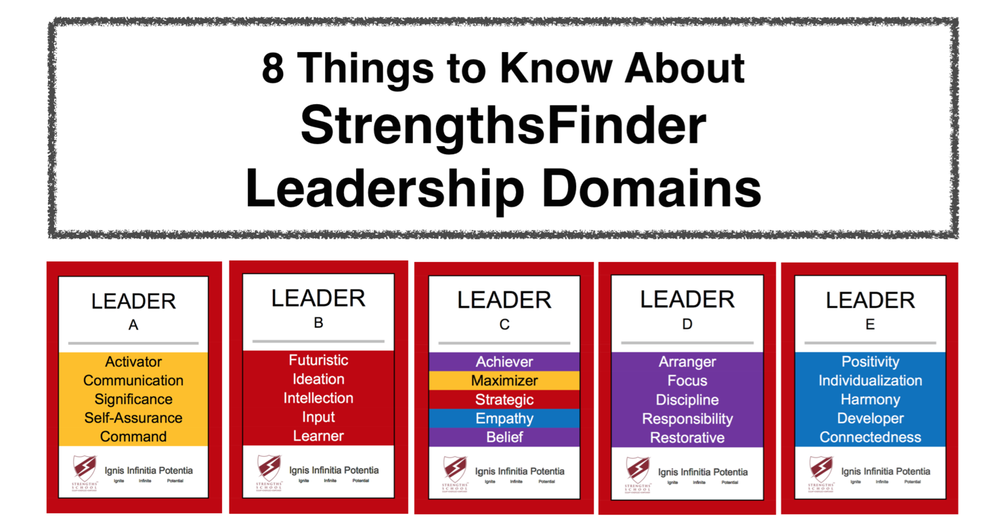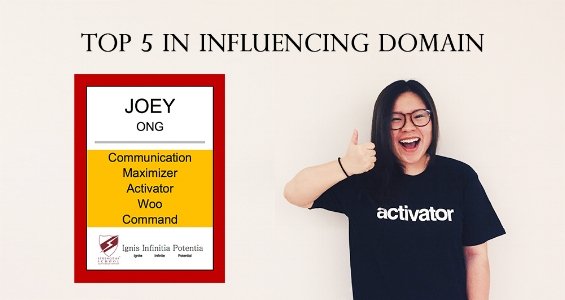8 Things To Know About StrengthsFinder Leadership Domains
As I facilitate StrengthsFinder Leadership workshops across Singapore and Asia, I am often asked many questions regarding the StrengthsFinder tool. One of the most common questions I'm asked as a Gallup Certified StrengthsFinder Coach has to do with the four domains of Leadership strengths. What do the domains mean, and how should individuals interpret their StrengthsFinder results based on the domains?
This article is intended as a StrengthsFinder resource answering the most common questions asked. It is important to first note that StrengthsFinder is always positioned as a developmental tool and used by managers and coaches in a variety of ways. Similar to each of the StrengthsFinder assessment results, the way to interpret and understand a person's domain is uniquely individualized. Based on my own learnings as a Singapore StrengthsFinder Gallup Certified Coach as well as the experience accumulated from the many workshops and coaching sessions I have done in Singapore and Asia, here are eight things that people need to know.
1. WHAT ARE THE FOUR DOMAINS OF LEADERSHIP STRENGTHS?
Each of the 34 StrengthsFinder Talent Themes are categorized under four different domains: Executing, Influencing, Relationship Building and Strategic Thinking. These four domains were named by Gallup based on the type of activities that the talent theme will most likely thrive in, although the themes are by no means limited to those activities.
2. WHAT IS A COMMON MISCONCEPTION PEOPLE HAVE ABOUT THE STRENGTHSFINDER DOMAINS?
One of the most common misconceptions is that people believe that a particular theme can only excel in the domain it is categorized in. This is untrue. The categorization of the domains in no way suggests that a particular theme will not be able to function well in another domain. It is by no means exclusive.
For example, the Learner theme, which is categorized under the Strategic Thinking domain, is often used to build relationships. Learners are curious about what makes their friends tick and what makes them upset. Learners are also curious to learn how they can strengthen their relationships with people from different communities.
The categorization of the domains simply highlights the area in which each talent theme can manifest its greatest impact when rightly engaged. When we subscribe to this common misconception, we will often believe a voice crying out: "Oh no, I do not have any strengths (in this domain)!" This deficit mindset causes the knowledge of the domains to be disempowering rather than empowering.
3. WHAT DO THE FOUR DOMAINS OF STRENGTH MEAN?
Each of the StrengthsFinder domains is a guide as to what the individual’s greatest value-add might be in the team. If we were to describe each of the domains as different parts of the human body, the Executing domain is like the hands and feet; Influencing, the mouth; Relationship Building, the heart; and Strategic Thinking, the brain.
The StrengthsFinder Talent Themes that are categorized in the Executing domain include Achiever, Arranger, Belief, Consistency, Deliberative, Discipline, Focus, Responsibility and Restorative.
When your talent themes are largely Executing in nature, it means you are someone who often intuitively wants to get things done and finish tasks successfully. The structure, system, budget, processes, timelines and rules are usually areas you are concerned about. While you might be often thought of as being task-oriented, people who work with you know that you can be highly depended on to get things done.
The StrengthsFinder Talent Themes that are categorized in the Influencing domain include Activator, Command, Communication, Competition, Maximizer, Significance, Self-Assurance and Woo.
When your talent themes are largely Influencing in nature, it means you are someone who wants to rally people towards a particular direction. People see you as someone with lots of energy. You are more likely to be perceived as an extrovert than introvert. You are concerned with motivating others, persuading others to take action, and pushing others towards breakthrough. The freedom to speak out, freedom to act, and freedom to make changes are often areas you are concerned with. People who work with you know that you are passionate when it comes to inspiring and rallying others for a cause.
These Influencing talent themes are also rarer (statistically) compared to others. It is extremely rare to find someone with all 5 of their top strengths in this domain. I had the privilege of conducting an interview with a Singaporean, Joey Ong, who is one of the few rare ones in the world to have such a combination.
You can read more in this StrengthsFinder interview article on Joey Ong.
The StrengthsFinder Talent Themes that are categorized in the Relationship Building domain include Adaptability, Connectedness, Developer, Empathy, Harmony, Includer, Individualization, Relator and Positivity.
When your strengths are largely relationship building in nature, it means you are someone who often wants to show care and concern to others, often through an emotional connection. People see you as someone who cares. You send the message that human relationships triumph over everything. You are concerned with authenticity, encouragement, listening to the unvoiced, and ensuring no one is left out. Hearing the hearts of people, feeling their emotions and connecting to communities are often areas you are concerned with. People who work with you know that you are well aware of the human needs of people and you are highly sensitive to them. I found a unique pair of Singaporean siblings who both had the same five strengths (in a different order) and interestingly, all five of their strengths fall in the relationship building domain.
You can read more about this interesting StrengthsFinder interview with the Singaporean siblings here.
The StrengthsFinder Talent Themes that are categorized in the Strategic Thinking domain include Analytical, Context, Futuristic, Ideation, Input, Intellection, Learner and Strategic.
When your talent themes are mostly Strategic Thinking in nature, it means you are someone who loves thinking. Your playground is in your mind. Facts, data, concepts, ideas, strategies, dreams, and having a big picture are often areas that are of concern to you. You need to know the purpose behind a plan. You enjoy opportunities to create new strategies and explore ideas and meaning. You need room to imagine, and you need your mind to be engaged. People who work with you know that you are often a source of wisdom, counsel and ideas because of your agile mind.
4. HOW DO THE STRENGTHSFINDER DOMAINS AFFECT WORK PERFORMANCE?
We can divide the four StrengthsFinder domains into two general categories: task-oriented and people-oriented. Strategic Thinking and Executing domains are primarily task-oriented, while Influencing and Relationship Building domains are primarily people-oriented. The two task-oriented domains move the team forward toward their goals, while the people-oriented domains rally people and hold the team together.
A side note here: the label “task-oriented” often gets a bad rap for not caring about people. However, it isn't the case that they do not care about relationships — only that they enjoy finishing the tasks at hand and they often build relationships through doing things for others.
Similarly, for the two people-oriented domains, it's not that the tasks are unimportant, only that the tasks are completed because they give meaning to the relationships that exist. Simply put, their motivation to complete the tasks comes from the relationships they are building.
5. WHY IS IT IMPORTANT TO UNDERSTAND THE STRENGTHSFINDER LEADERSHIP DOMAINS?
Domains help us to understand strengths from another angle. According to the Strengths-based leadership philosophy, individuals need not be well-rounded, but teams should be. In fact, a well-rounded team with a representation of talent themes from all four domains often have valuable contributions that lead to high levels of performance.
As individuals, by understanding our dominant domains (the domain that most of our strengths lie in), we can understand the kind of tasks we are likely to excel in. We will also be aware of our greatest contributions to the team we are in. Understanding domains thus opens up new possibilities for us to grow our raw talents into strengths. The knowledge of our dominant domains also helps us to seek complementary partnerships. We can seek partners to leverage and strengthen the domains we are not so dominant in, thus creating effective collaborations.
On a team level, understanding domains also gives us an idea of how we usually impose ourselves on others (often without being aware of it) - through the lenses of the domain filters. This understanding allows us to have greater self-awareness and to regulate our behaviors when it comes to working in a team. Domains also allow a team to understand from another perspective the areas it needs to watch out for in terms of its most competitive edge and its weakest link.
6. WHAT DOES IT MEAN WHEN MOST OF MY STRENGTHS ARE IN ONE DOMAIN?
It means that the tasks and scope of work in that particular domain will be your greatest value-add to any team or community you are in. You are likely to feel most engaged when you contribute in that particular domain – and even more so when your contributions are acknowledged by the team.
A team leader would do well to take note of the great value that exists within the team, and intentionally create opportunities that leverage and maximize each person’s unique contribution.
7. WHAT IF MY STRENGTHS ARE EVENLY SPREAD OUT AMONG ALL FOUR DOMAINS?
There is no cause for alarm. Firstly, it means you are one of the unique ones who can give different perspectives (spanning across all domains) without overweighing any particular domain. Your view will tend to be a more "balanced" one, and that is a great value-add to any team. Most people usually overweigh their judgements in one domain.
8. WHAT SHOULD I WATCH OUT FOR IF I AM VERY STRONG IN ONE PARTICULAR DOMAIN?
There are two main things to watch out for. Firstly, know that the perspectives in that domain can be extremely strong. Any job that does not engage the strengths in that domain can lead to low motivation and disillusionment. Secondly, it means you will need to form good partnerships with others who are strong in the other domains.
Let me elaborate on the first point of engaging the strengths in that dominant domain. For people who have 4 or 5 of their dominant themes in one particular domain, they need to be quite selective about the roles they take on at work. Regular check-ins with your manager is a must to ensure that opportunities are sufficient for these strengths to be engaged. After all, based on Gallup's Q12 Engagement Survey, the key question to discovering whether a person is being strongly engaged is: "At work, do I have the opportunity to do what I do best every day?"
Secondly, it is my professional opinion (as a Singapore StrengthsFinder Gallup Certified Coach) that a person who dominates one particular domain needs to form good partnerships with others who are strong in the other domains. This person needs to build trust with these partners and be very open to feedback.
Strong partnerships can be formed by operating in humility and by being very conscious of the need to be interdependent. By being very open to the perspectives of others (especially if those perspectives are in your lesser domains), blind spots can be uncovered. This naturally gives the individual a greater chance of success as he or she focuses on strengths and manages weaknesses.
A person needs to have a deep sense of security about themselves. Unfortunately, in my experience as a StrengthsFinder coach, what usually becomes the talking point among others are the domains that an individual lacks rather than the one that the individual is strong in. We live in a world filled with people who look more at the bad rather than the good (I believe this mindset can be changed, but I’m just being realistic here.)
While I believe strongly that #EveryoneNeedsACoach, I would strongly advise a person with such dominant strengths in one domain to find a personal coach or mentor who understands how to bring out the best in him.
Concluding Thoughts: This topic on the StrengthsFinder Leadership domains remains one of the most important areas to be understood, especially for Managers and Team Leaders. In a very competitive business environment, the leader who can strongly leverage on the unique contributions of each team member is the one who can lead a team to perform at a very high level. Gallup's research has shown that it is the role of the manager to have the wisdom and understanding to create such a culture. I strongly believe this to be true.
Written by Victor Seet
Activator • Communication • Strategic • Self-Assurance • Command
As a Gallup certified StrengthsFinder coach, Victor is passionate about strengths engagement and now runs his own training company, Strengths School™. He has been actively giving StrengthsFinder leadership and team building workshops to businesses and schools in Singapore as well as Hong Kong, China (Nanjing and Shanghai) and India. He also writes frequently on his blog (victor-seet.com).






